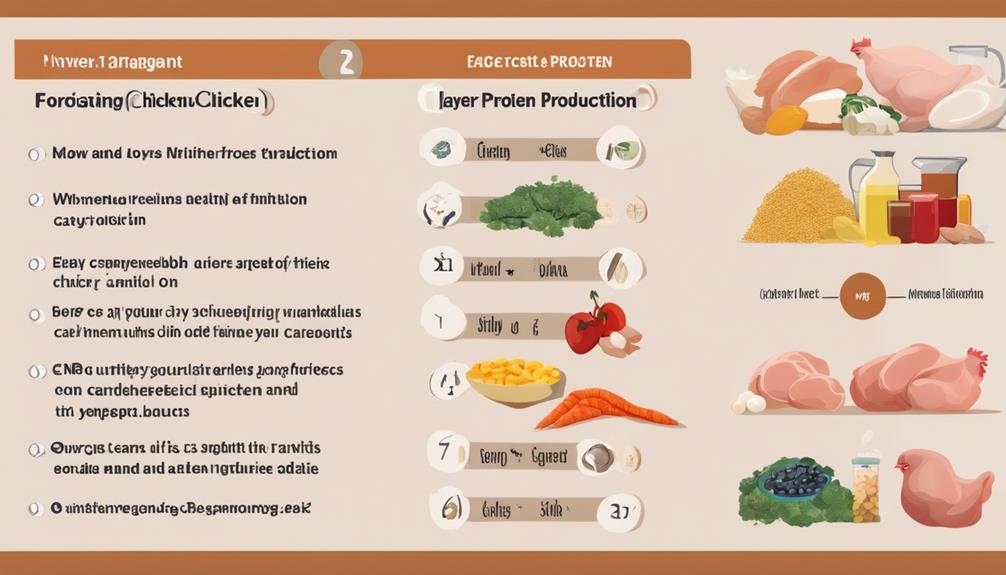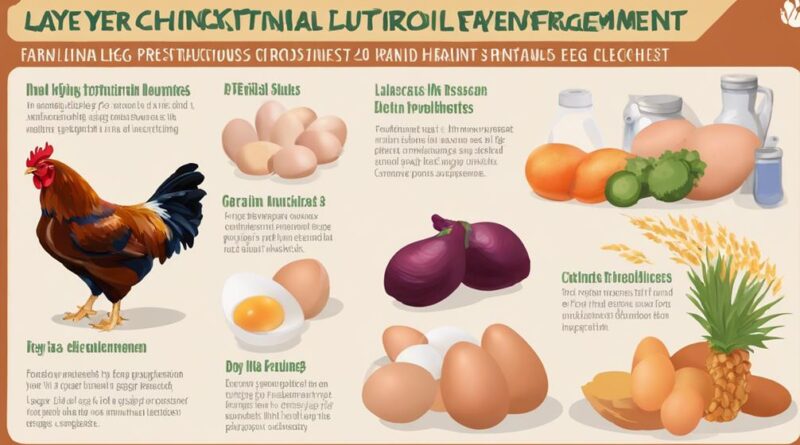Top 7 Nutritional Requirements for Layer Chicken Production"
Ensure peak performance of your layer chickens by prioritizing these 7 vital nutritional needs: Protein & Amino Acids for growth and egg production. Energy Sources for metabolic functions. Vitamins like A, D, and E for health and egg quality. Minerals such as calcium and zinc for enzyme function. Fiber for optimal digestion and gut health. Quality water crucial for egg production and health. Balancing nutrients accurately ensures no deficiencies. Understanding these requirements is key to successful layer chicken production.
Protein Requirements
To maximize egg production in layer chickens, meeting their specific protein requirements is crucial. Protein plays a vital role in the growth and development of layer chickens, directly impacting their overall health and productivity. When formulating feeds for layers, it's essential to consider the amino acid balance to ensure optimal growth performance and egg production.
In feed formulation for layer chickens, selecting appropriate protein sources is fundamental. Common protein sources include soybean meal, fish meal, and canola meal. These sources vary in their amino acid profiles, highlighting the importance of achieving a balanced combination to meet the birds' specific requirements. Ensuring the adequate balance of essential amino acids such as lysine, methionine, and cysteine is crucial for maximizing growth and egg production in layers.
Research has shown that the protein levels in layer diets significantly impact growth performance and egg quality. A diet with the correct protein content not only supports optimal growth but also influences the size and quality of eggs produced. Therefore, formulating feeds with the right protein levels and amino acid balance is key to achieving high productivity and profitability in layer chicken production.
Energy Needs
Meeting the energy needs of layer chickens is imperative for sustaining their metabolic functions and supporting productive egg laying. Energy requirements vary depending on factors such as age, size, environment, and production level. To meet these needs effectively, it's essential to implement appropriate feeding strategies that provide sufficient energy to support the metabolic demands of the birds.
Layer chickens require a well-balanced diet that includes adequate energy sources to maintain their daily activities and egg production. Energy is primarily derived from carbohydrates, fats, and proteins in the diet. Carbohydrates are a crucial energy source for chickens as they're efficiently converted into glucose, providing readily available energy. Fats are another essential component of the diet, offering a concentrated source of energy that's particularly beneficial during periods of high production or environmental stress. Proteins, although primarily known for their role in muscle development, also contribute to energy provision when carbohydrates and fats are insufficient.
When formulating diets for layer chickens, it's vital to consider the metabolic demands associated with egg laying. The energy requirements for layers increase significantly during peak production periods, necessitating adjustments in feeding strategies to meet these elevated needs. By providing a well-balanced diet rich in energy sources and tailored to the specific metabolic demands of layer chickens, producers can optimize egg production and overall flock health.
Vitamin Essentials
Layer chickens rely on a range of essential vitamins to support their overall health and optimize egg production. Vitamin supplementation plays a crucial role in enhancing their growth performance, egg quality, and immune system boost.
Vitamins are vital micronutrients that act as catalysts for various physiological processes within the chicken's body. Vitamin A, for instance, is essential for maintaining healthy vision, promoting growth, and supporting the immune system. Vitamin D is crucial for calcium absorption and utilization, which is necessary for the formation of strong eggshells. Vitamin E acts as an antioxidant, protecting cells from damage and supporting overall health.
Incorporating a well-balanced vitamin supplement in the layer chicken's diet is key to ensuring optimal egg production and overall well-being. Deficiencies in vitamins can lead to a decrease in egg quality, growth issues, and a weakened immune system. Therefore, providing the right amount of vitamins through high-quality feed or supplements is essential for maximizing the productivity and health of layer chickens.
Mineral Necessities
Layer chickens require specific mineral supplements to support their physiological functions and egg production. Calcium and phosphorus are crucial minerals for layer chickens. Calcium sources such as limestone, oyster shells, or eggshells are essential for proper eggshell formation, muscle function, and nerve transmission. Phosphorus sources like bone meal or defluorinated rock phosphate are necessary for skeletal development, energy metabolism, and overall growth.
In addition to calcium and phosphorus, trace minerals play a vital role in the health and productivity of layer chickens. Trace minerals are required in small amounts but are essential for various physiological functions. Zinc, copper, manganese, and selenium are examples of trace minerals that can be supplemented through commercial feed or mineral mixes. These minerals are crucial for enzyme function, immune response, and feather quality in layer chickens.
Micronutrients are another important aspect of mineral necessities for layer chickens. Micronutrients such as iron, iodine, and cobalt are required in trace amounts but are indispensable for metabolic processes, hormone synthesis, and overall health. These micronutrients can be provided through well-balanced layer feed or specific mineral supplements tailored to meet the chickens' nutritional requirements.
Ensuring the proper intake of calcium, phosphorus, trace minerals, and micronutrients is essential to support the optimal health, egg production, and overall performance of layer chickens. By meeting these mineral necessities, you can help your chickens thrive and lay high-quality eggs consistently.
Fiber Intake
To optimize the nutritional balance of your chicken's diet, ensuring adequate fiber intake is crucial for promoting digestive health and overall well-being. Fiber plays a vital role in the gastrointestinal tract, aiding in digestion and supporting gut health. When considering feed composition for your layer chickens, here are three key points to keep in mind:
- Types of Fiber: Different sources of fiber can impact gut health differently. Insoluble fibers, such as cellulose and hemicellulose found in plant materials like hay and straw, help maintain proper gut motility and prevent issues like impacted crop or ceca. Soluble fibers, such as pectin and beta-glucans found in fruits and vegetables, support the growth of beneficial gut bacteria and contribute to overall digestive health.
- Fiber Levels: Balancing the amount of fiber in your chicken's diet is essential. Too little fiber can lead to digestive disturbances, while excessive fiber intake may interfere with nutrient absorption. Understanding the fiber content of various feed ingredients and adjusting the overall fiber level in the diet can help prevent digestive issues and optimize gut health.
- Fiber Fermentation: Fiber fermentation in the ceca of chickens is a crucial process that produces short-chain fatty acids, which serve as an energy source for the birds. Ensuring adequate fiber intake promotes healthy fermentation processes, supports the gut microbiota, and contributes to overall digestive well-being for your layer chickens.
Water Consumption
Adequate water consumption is fundamental to ensuring optimal health and performance in layer chicken production. Hydration management is crucial for the well-being of your flock. Water quality plays a significant role in maintaining the health and productivity of your layers. Monitoring the performance of your chickens can provide valuable insights into their water consumption patterns.
Ensuring that your layer chickens have access to clean and fresh water at all times is essential. Water quality can directly impact egg production, feed utilization, and overall health. Poor water quality can lead to decreased egg production, lower feed efficiency, and various health issues.
Monitoring the water consumption of your layer chickens is a key aspect of performance monitoring. Changes in water intake can be an early indicator of health problems or environmental stressors. Regularly tracking water consumption patterns can help you identify and address issues promptly.
Proper hydration management has numerous health benefits for layer chickens. It helps regulate body temperature, aids in digestion, nutrient absorption, and waste elimination. Additionally, adequate water intake supports the overall well-being and immune function of your flock.
Balancing Nutrients

Balancing essential nutrients is vital for optimizing the health and productivity of layer chickens in production settings. Proper feed formulation is crucial to ensure that chickens receive the necessary nutrients in the right proportions.
Here are three key considerations for balancing nutrients in layer chicken production:
- Feed Formulation: Feed formulation involves selecting the right combination of ingredients to meet the nutritional requirements of layer chickens. This process requires a deep understanding of the nutrient content of various feed ingredients and the specific needs of the chickens at different stages of production.
- Nutrient Ratios: Achieving the correct nutrient ratios in the feed is essential for supporting the health, growth, and egg production of layer chickens. Nutrient ratios refer to the proportions of proteins, carbohydrates, fats, vitamins, and minerals in the feed. Imbalances in these ratios can lead to nutritional deficiencies or excesses, impacting the overall performance of the chickens.
- Precision and Monitoring: Balancing nutrients is an ongoing process that requires precision and regular monitoring. Nutrient requirements can vary based on factors such as age, breed, environmental conditions, and production goals. Regularly evaluating the nutritional content of the feed and adjusting formulations as needed is critical to ensure that layer chickens receive the optimal balance of nutrients for their health and productivity.
Frequently Asked Questions
How Can I Prevent My Chickens From Getting Overweight?
To prevent your chickens from getting overweight, focus on weight management through a balanced chicken diet and an exercise routine.
Overweight chickens can face health risks like fatty liver disease and reduced egg production. Ensure your chickens are fed the appropriate amount of feed and provide opportunities for them to move and exercise.
This proactive approach will help maintain your chickens at a healthy weight and promote their overall well-being.
Are There Specific Minerals That Can Improve Eggshell Quality?
To improve eggshell quality, consider specific minerals. Calcium is crucial for shell strength, while phosphorus levels influence shell thickness. Balancing these minerals in your layer chicken's diet is essential.
Providing adequate calcium requirements and monitoring phosphorus levels can positively impact eggshell quality. Maintaining the right mineral balance supports healthy egg production and ensures your chickens lay eggs with strong and durable shells.
What Is the Ideal Temperature Range for Layer Chickens?
To ensure optimal conditions for your layer chickens, it's crucial to maintain a temperature range between 65-75°F. This range helps prevent heat stress, ensuring consistent egg production.
Additionally, maintaining dietary balance is essential for eggshell quality and overall health.
Can I Provide Too Much Fiber in My Chickens' Diet?
Providing too much fiber in your chickens' diet can disrupt the fiber balance crucial for their digestive health. It may lead to reduced egg production and overall health issues. Ensure a proper balance of fiber sources to support optimal digestion and egg-laying.
Monitoring fiber intake is essential for maintaining the well-being and productivity of your layer chickens. Striking the right balance is key to their overall health and performance.
How Can I Identify and Correct Nutrient Deficiencies in My Flock?
To identify deficiencies in your flock, observe for signs like poor egg production or abnormal feathering. Conduct regular blood tests and consult a poultry nutritionist for specific guidance.
Correcting deficiencies involves adjusting the diet by adding supplements or changing feed composition. Ensure the birds have access to clean water and well-balanced feed.
Seek professional advice if issues persist to maintain optimal health and productivity in your flock.
Conclusion
In conclusion, meeting the nutritional requirements of layer chickens is crucial for optimizing production and health.
Ensuring proper levels of protein, energy, vitamins, minerals, fiber, and water intake is essential for achieving high egg production and overall well-being.
It's important to carefully balance these nutrients to support the growth and performance of layer chickens in order to maximize productivity and profitability in poultry operations.
